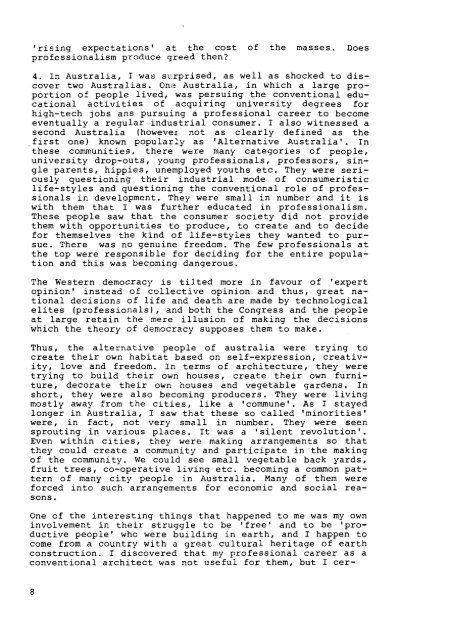Ifda dossier 47, May/June 1985
Ifda dossier 47, May/June 1985
Ifda dossier 47, May/June 1985
Create successful ePaper yourself
Turn your PDF publications into a flip-book with our unique Google optimized e-Paper software.
'rising expectations' at the cost of the masses. Does<br />
professionalism produce greed then?<br />
4. In Australia, I was surprised, as well as shocked to dis-<br />
cover two Australias. On,? Australia, in which a large pro-<br />
portion of people lived, was persuing the conventional edu-<br />
cational activities of acquiring university degrees for<br />
high-tech jobs ans pursuing a professional career to become<br />
eventually a regular industrial consumer. I also witnessed a<br />
second Australia (howeve1 not as clearly defined as the<br />
first one) known popularly as 'Alternative Australia'. In<br />
these communities, there were many categories of people,<br />
university drop-outs, young professionals, professors, sin-<br />
gle parents, hippies, unemployed youths etc. They were seri-<br />
ously questioning their industrial mode of consumeristic<br />
life-styles and questioning the conventional role of profes-<br />
sionals in development. They were small in number and it is<br />
with them that I was further educated in professionalism.<br />
These people saw that the consumer society did not provide<br />
them with opportunities to produce, to create and to decide<br />
for themselves the kind of life-styles they wanted to pux-<br />
sue. There was no genuine freedom. The few professionals at<br />
the top were responsible for deciding for the entire popula-<br />
tion and this was becoming dangerous.<br />
The Western democracy is tilted more in favour of 'expert<br />
opinion' instead of collective opinion and thus, great na-<br />
tional decisions of life and death are made by technological<br />
elites (professionals), and both the Congress and the people<br />
at large retain the mere illusion of making the decisions<br />
which the theory of democracy supposes them to make.<br />
Thus, the alternative people of australia were trying to<br />
create their own habitat based on self-expression, creativ-<br />
ity, love and freedom. In terms of architecture, they were<br />
trying to build their own houses, create their own furni-<br />
ture, decorate their own houses and vegetable gardens. In<br />
short, they were also becoming producers. They were living<br />
mostly away from the cities, like a 'commune'. As I stayed<br />
longer in Australia, I saw that these so called 'minorities'<br />
were, in fact, not very small in number. They were seen<br />
sprouting in various places. It was a 'silent revolution'.<br />
Even within cities, they were making arrangements so that<br />
they could create a community and participate in the making<br />
of the community. We could see small vegetable back yards,<br />
fruit trees, co-operative living etc. becoming a common pat-<br />
tern of many city people in Australia. Many of them were<br />
forced into such arrangements for economic and social rea-<br />
sons.<br />
One of the interesting things that happened to me was my own<br />
involvement in their struggle to be 'free' and to be 'pro-<br />
ductive people' who were building in earth, and I happen to<br />
come from a country with a great cultural heritage of earth<br />
construction. I discovered that my professional career as a<br />
conventional architect was not useful for them, but I cer-
















